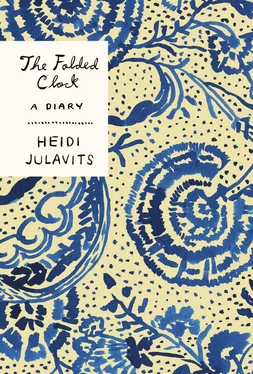Moore apparently replied, “Mr. Pym, sometimes one must be ruthless .”
I’m sure Mr. Pym, this too-nice man, was often ruthless. I think a lot of self-defined nice people are ruthless. I do not consider this a cynical stance. I consider it a realistic understanding of the word “nice.” If a nice person is famous or successful — and plenty are — that person is not so nice that they are above heeding the logic of status improvement. Right now I am reading a nonfiction book in which a certain poet is portrayed (within the normal range of such things) as ambitious and calculating. I was frankly relieved to discover she was ambitious and calculating because, a few months earlier, I’d read her memoir. She’d presented herself as an angel, a guileless art angel. Her passive approach seemed to implicitly criticize people who had to actually try to succeed. She’d just made art alone in her crappy loft. Fame had found her.
But fame hadn’t. Fame doesn’t. Recently a writer I know expressed irritation with another quite famous writer’s claim that she’d just been a mother, and she’d just sat at her kitchen table writing stories while her kids napped, and that she had no ambition at all. “That’s bullshit,” this irritated writer said. “So an editor decided to randomly phone this housewife and ask her for some stories?”
I’m messily conflating ambition and not-niceness here. To some, to me, I guess, there’s a connection. To be ambitious — to exert one’s self-interested desires beyond the scope of one’s own head — could be seen as impolite. As not nice. I have always been nice; I have been told by others how nice I am. The one person who does not think I’m nice is me. This is because I am ambitious and competitive, and so I must be not nice to someone in order for my otherwise niceness to feel authentic. I am not nice to myself by believing I must pay more than others, and sometimes for others. When I go out to lunch with a person, I must always pay the entire check; splitting isn’t allowed, and I will never permit another person to pay for me. I sometimes think my sense that I must pay comes from growing up in Maine. The five purely beautiful summer days per year are mortgaged hard against months and months of mud and ice and damp. The Maine weather instills in one’s psyche a seasonal rhythm of payment. Of the cost of joy coming due.
Today I sought advice from the therapist at my daughter’s school. My daughter and I are victims of a co-produced play that begins and middles and ends with screaming, tears, accusations of heartlessness and disaffection, faked injuries, faked heartbreak that hides real heartbreak. There’s an oxymoronic quality to the unremitting pitch of our relationship; it’s a screeching flat line. Finally I could no longer take this relationship. I am not saying that I am not the crazy person here. I am saying I am the adult. I can throw up my hands and claim powerlessness. As the adult, this powerlessness has serious power.
So I contacted the Feelings Doctor. The Feelings Doctor works at my daughter’s school. We made an appointment, just the doctor and me. Before our meeting, I mapped out what I planned to say to her. I wanted to be efficient. I wanted to provide an accurate history, but mostly I wanted to get down to business. Establishing background exhausts me. I don’t tend to do it. I start talking and the listener can fill in the blanks as he or she chooses. My husband calls me No Context Woman. “ ‘The journey is the goal’ is not the goal” is my motto. The goal is the goal. Let’s start with the end.
To this end, I had a probably bad idea: I could send the Feelings Doctor an essay I’d written about my daughter and our traumatic history together. I thought the Feelings Doctor might get a very good sense, an arguably more thoughtful and comprehensive sense, of this history by reading an essay.
But then I realized how insane this might make me appear to be. A mother contacts a Feelings Doctor to speak about her troubled relationship with her small daughter. Instead she sends the doctor her own writing, turning the therapy session into an opportunity for the therapist to respond to her artistic representation of the problem, rather than the problem itself. How could I appear as anything other than a narcissist, or a writer greedy for more readers, or a mother so self-involved that she pretends to care about her daughter when, in fact, she’s using the appointment as a sneaky means of gaining an intimate tête-à-tête about her own work with a stranger?
I decided against sending the Feelings Doctor my essay; I regret now that I didn’t. I arrived early for the appointment, and good thing, too. I busted the Feelings Doctor lacing up her escape sneakers; she’d forgotten we were supposed to meet. (I seem to have this effect on therapists.) She asked me some questions and didn’t really listen to the answers. She said, “Children these days have so much attention paid to them that they can’t handle a moment of neglect.” I corrected her; in fact, our situation was slightly more complicated. To state it uncomplicatedly, and thus probably inaccurately, I resented my daughter’s need of me and thus punished her by neglecting her.
Then the Feelings Doctor told me everything I already knew about my daughter, everything I’d already written about her. I wished I’d given the Feelings Doctor my essay. Not because we would have wasted less time. Not because we would have reached a solution faster. I think I understand, for the time being, at least, that therapy is unable to tell me anything new about myself or my loved ones. But therapy could tell me many interesting things about a stranger. About a person I hope I’m not. It could tell me something about a woman, for example, who makes an appointment with her daughter’s therapist as an excuse to talk about her writing. What might a therapist be able to tell me about that woman? I wanted to know more about her.
Today I swam out to sea with a stranger. Since my usual swimming partner had left town, I’d put the word out — Swimmer Too Scared to Swim Alone Needs Swim Partner. I am scared to swim alone not because I might drown but because I might be attacked by a shark. Mine is an unwarranted phobia (shared by basically every person in my generation, i.e., those of us who grew up with Jaws ); companionship is an illogical cure. To date, there have been no shark attacks in our harbor. Should a shark, against all statistics, appear, a friend (unless he or she is swimming with a machine gun) will be unable to save me from it. But I feel safe in knowing — before I am pulled underwater to my death by an animal, I can share a final what the fuck? moment with a sympathetic human.
This is the only protection I require.
A friend invited me to swim off her property with her sister, a woman who sees ghosts. The sister and I swam to a motorboat, then to a buoy, then to a lobster boat. We talked about the real estate coincidence that binds us. My husband and I looked at her mother’s house to buy, but instead we bought ours. Her mother looked at our house to buy, but instead she bought hers. I told the woman who was sensitive to ghosts that the reason we hadn’t bought her mother’s house was because it had — and I hoped I wasn’t insulting her by saying this — bad energy. Even my mother, not a woman who’s ever anxious about energy save the kind that can, via the cord on your coffeemaker, maybe burn your house down, agreed with me. “I think I’d kill myself if I lived in this house,” my mother said when the real estate agent was out of earshot.
The woman with whom I was swimming, however, said she hadn’t experienced any bad vibes in that house, which was strange given she was so sensitive to spiritual entities. She told me about the ghost she’d seen when she was a child, a man in an overcoat walking up the stairs in her house who was “definitely malicious.” She’d seen other ghosts as well. As we rounded the lobster boat we talked about the lodge that was for sale right in front of us. Twenty-one bedrooms for under a million dollars. Why was it such a steal? Maybe it was haunted? We fantasized about tearing down the haunted parts, like amputating a cancerous limb. Would this work? It didn’t always work with actual cancer. It hadn’t worked with the bamboo in our backyard. Our soil was poisoned by mutant cells. No matter if we killed the plants, their undead genetic material lurked underground and reappeared in strange places, like halfway up the outside wall of our barn.
Читать дальше












